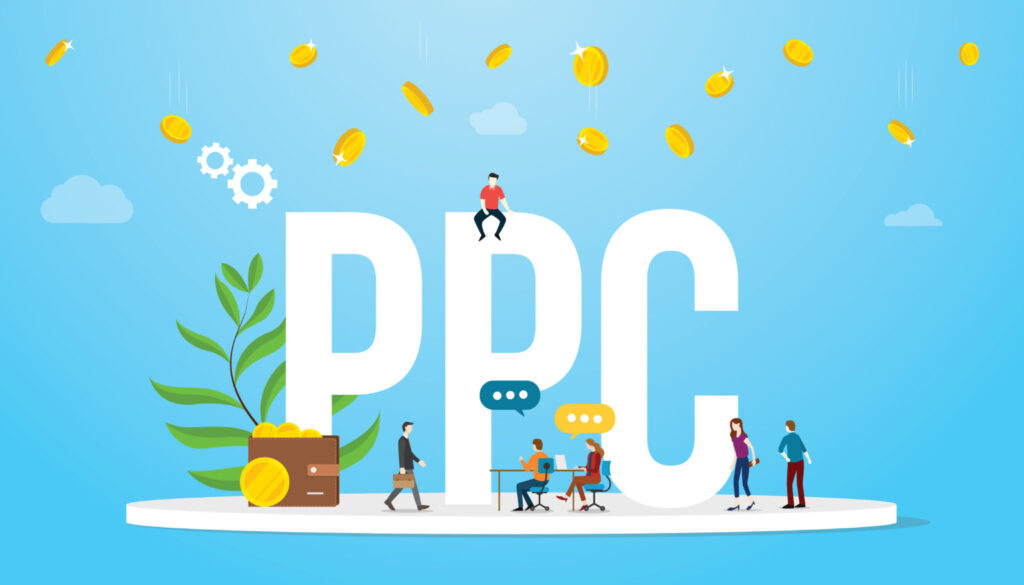What is PPC? How does Search Engine Ads Work?
In this blog, I will try to cover all the important aspects with all that you want to know about the astonishing universe of paid hunt promoting, advertisements, biddings, and offers, search engine ranking
So let’s come to the main point
What Is PPC?

Pay-per-click (PPC) is an advertising model that allows promoters to put promotions on the search engine and on the websites that the search engine shows and google takes some money after every click on your ads
The objective of the promotion is to get leads, sales, and views to grow your business fast. Web crawlers are famous host stages as they permit promoters to show advertisements applicable to what clients are looking for.
Search engines like Google Ads and Microsoft Ads charge fees on the model called real-time bidding, it is like automated bidding where the highest bidder can be shown on the lowest page because of the factor called Ads quality that I will cover below. So read it till last.
How Paid Search Works?

Source: RevolutionParts
Each time there is an advertisement spot on a search engine result page or SERP, the search engine does an instant automated auction and many factors involve in this paid search to rank the ads from top to bottom.
Factors like ad quality and bid amount affect the ranking of the ads and due to these factors, search engine decides which ads to show first and which ads to last.
These factors are what keep the wheels of Pay-Per-Click moving. They start when somebody looks for something on SERP. In case there are promoters keen on showing advertisements identified with a client’s hunt inquiry, an auction takes place based on the query of visitors on the search engine. The advertisements that successfully win the auction by bidding, at that point, show up on the SERP.
To take part in these auctions for advertising on SERP, promoters use accounts like Google Ads to set up their advertisements and figure out where and when they might want those advertisements to show up.
In the account of the search engine, there are many areas like campaigns and ad groups. Ad groups are the same that it sounds, it is a group of ads that has similar targets and each campaign is made up of one or more ad groups that have keywords. So that it can be easy to manage and target your audience
Keywords
To know more about what your target audience is searching on the search engine result page you will have to use Google’s own keyword planner or any keyword planner that you can use more efficiently for better results.
Many types of keywords can be used to target your audience
Broad Match: Broad match is the kind of keyword that helps you to reach a wider audience so that you can reach more to your goals but it has a downside that it can target irrelevant audiences.
Modified Broad Match: These types of keywords help you to control your ads and use them more efficiently by increasing the relevancy of your audience.
Exact Match: These types of keywords finds an audience for your ads that searches the exact query that your keyword has so that you get the most relevant audience for your website that can be easily converted but on the other hand it loses the opportunity of getting an audience that searches product or services like yours in other words that you haven’t used in your keyword.
Phrase Match: These types of keywords come in between as they are more focused than a broad match but less focused than an exact match. In the phrase match, you will get an audience that searches queries related to your keyword or sometimes additional with your keywords
Negative Keywords: If you want to exclude certain words that you think might get you an irrelevant audience then you can use negative keywords e.g. if you are selling mobile covers but you don’t want your ads to appear on visitors who are looking for mobile phones.
Ads
To make your ad visible on the search engine you will have to make ads in your campaigns apart from searching for keywords and you will have to make it eye-catching because the ad is the only thing that your targeted audience will see first not your website or your content inside the website, but only ad.
Ads contain headlines, descriptions, and an URL but you can also feature paid ads called ad extensions it is free and very effective and it is highly recommended to use that feature. Extensions like callout extension, site link extension, and structured snippet are some of the most used extensions.
These extensions are really great to engage your audience by showing you ads only because of their appearance.
Budget and biddings
For making ads you will have to participate in an auction and win the auction and to win the auction you don’t necessarily have to bid high. It is just to know how much you are willing to pay for the ad. You can set your monthly budget on google ads and someday you will be charged higher and someday you will be charged lower but at the end of the month, you will be charged the exact amount that will be set on your monthly budget.
Many people use an automated bidding strategy and in this strategy, Google will try to give the best outcome in the most appropriate way. But that doesn’t mean Google will overspend your money and the most important factor of the paid ads will be ad quality, if you will increase your ad quality you will even rank on top with the lowest bidding also.
Ad rank
As I mentioned much time that bidding is not the only way to make your ad visible on top of the search engine as Google consider factors like:
Bid Amount: That I already explained to you above
Ad quality: It is the most important part of ad rank that decides whether you will rank top or bottom. Ad quality consists of factors like landing page quality, relevancy, historical CTR.
If your landing page is of very low quality e.g. slow speed, bad user experience can make your landing page quality very low.
The keyword that you are adding must be relevant to your ad and landing page if your keyword is not relevant then it can negatively affect your ad rank.
If you have already used ad manager then ad rank will also get impact from your historical ad and its CTR e.g. if your past ads were very good then it can increase your ad rank if it wasn’t then it might affect negatively your ad rank.
Your ad rank might also get impact from the ad format like ad extension, the way you target your audiences like device targeting, and timing and day of your ad.
Targeting
By choosing relevant keywords we optimize our ad but we can also optimize more our ad with the help of targeting so that we can narrow our reach to get the most relevant audience that can be easily converted.
The targeting option that google ad manager provides are:
Device Targeting: In this option, the advertiser can target their audience by choosing which device they mostly use e.g. if you are targeting some big business then your main priority should be desktops instead of mobile phones. And if you are targeting someone who is looking for mobile cover then your main focus should be Mobile Targeting.
Location Targeting: As the name suggests, in this option advertisers can target their audience by their location e.g. if you have a local store that is located in Mumbai then you can easily target from this option
Day and Time Targeting: In this option, you can choose the day and timing of your ad so on that time and day it will start showing your ad to your audience e.g. if you want to target your audience who is looking for fun and you are providing something that can thrill their weekend, so you can choose to target your audience on weekends
Demographic Targeting: In this option, the ad manager provides you with targeting opportunities for your audience like their marital status, gender, household income, etc. so that you can easily target your audience.
Types of Campaigns
Google gives different campaigns opportunities to its advertisers so that advertisers can choose the best way to interact with their audience.
Search Campaigns: These types of campaigns help advertisers to reach their audience with the help of eye-catching text ads.
Display Campaigns: These types of campaigns help advertisers by showing their ads on different websites with the help of content like photos and texts
Video Campaigns: These types of campaigns help advertisers by showing their video ads on YouTube and across the web.
Smart Ads: If you don’t want to waste your time by selecting an audience and researching keywords then this ad can be very helpful to you.
Local Campaigns: If you have your physical store then it will attract your audience by showing your ads on google map.
So these are some of the campaigns that advertisers mostly use for better results.
Types of goals that you can choose from ad manager
Sales: This will be perfect if you want more sales, online conversions, store sales, etc.
Leads: As the name suggest if you choose this goal then you can get leads from the audience who are interested in your product or services through email sign-ups and contact details submissions.
Website Traffic: If your goal is to get lots of visitors then you choose this goal option in ad manager.
Brand Awareness and Reach: If you want to increase your product or services awareness then you can choose this goal option. If you have launched something new in your business and want others to know then this can be very helpful for your goals.
So above that I mentioned are the goals that you can choose from that can be very helpful for your business.
Summary
In this blog, I have mentioned what PPC is, how it works, its features, and its benefits. So if you are still confused that this will be difficult then contact us we would be happy to assist you in reaching your goals.

